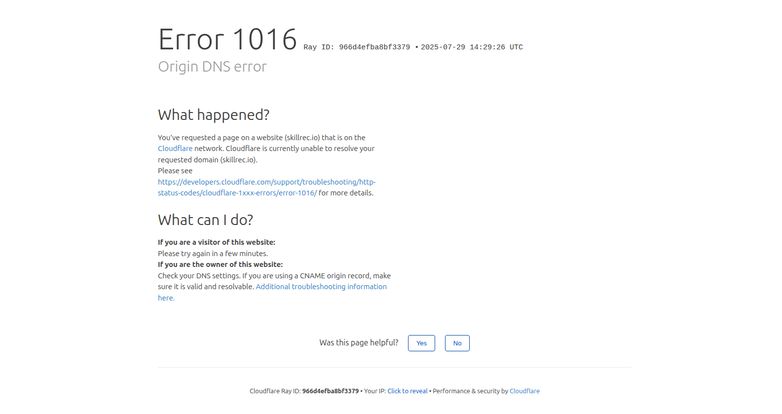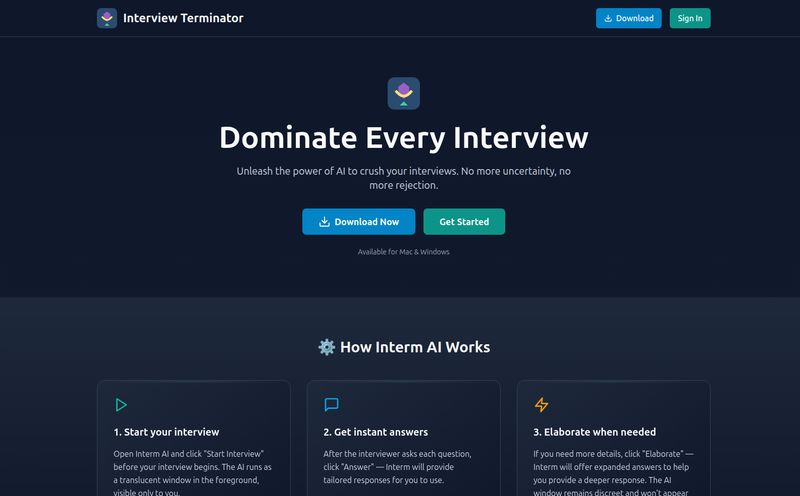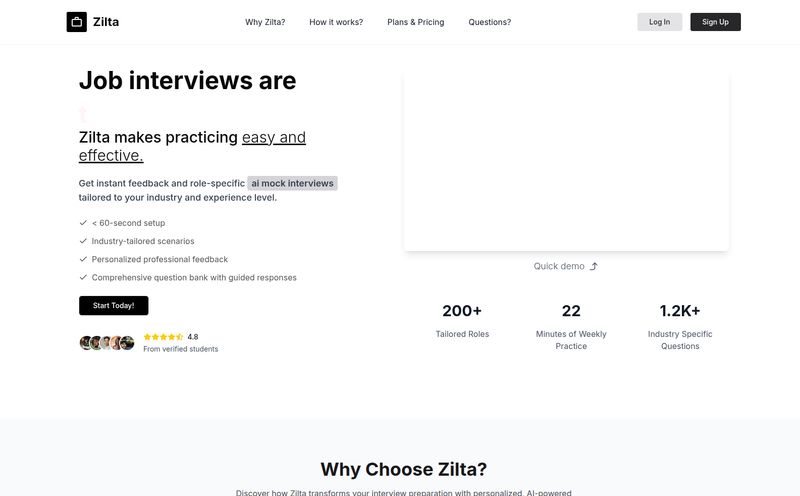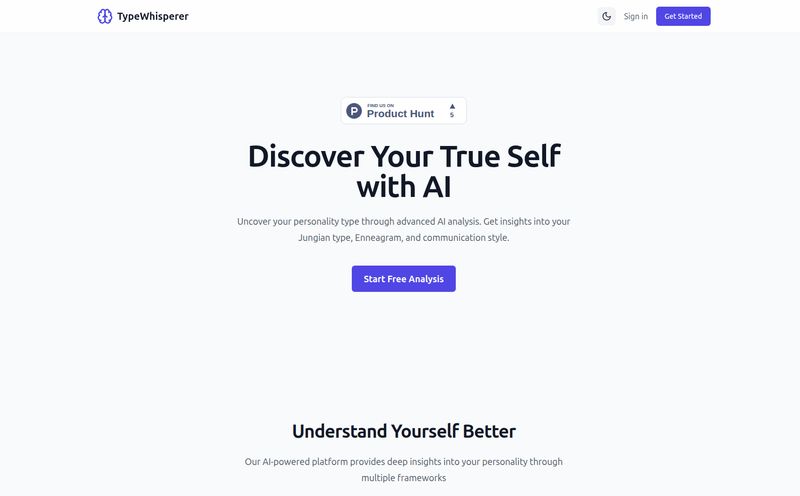If you've ever been involved in hiring engineers, you know the pain. The excruciating pain. Scheduling tech interviews is a nightmare. A full-blown, calendar-exploding, soul-crushing nightmare. It's a delicate dance of coordinating between your already-overbooked engineering team and a candidate who is likely juggling interviews with five other companies. It's exhausting.
For years, we've been looking for a better way. A way to reclaim those hours spent on first-round phone screens that go nowhere. This is where the idea of asynchronous technical interviews comes in, and it's a trend I've been watching closely. The promise is simple: assess candidates on your own time. And a new player on the block, SkillRec.io, claims to do just that with a healthy dose of AI.
But here's a funny thing that happened on the way to the review. As I sat down to write this, I pulled up their site and was greeted by... an error. A big ol' Cloudflare "Error 1016: Origin DNS error." We'll get back to that. Because honestly, it's part of the story.
So What is SkillRec.io Anyway?
Putting aside its current DNS woes, SkillRec.io is an AI-powered platform designed to streamline how companies conduct technical interviews. Think of it as a take-home test on steroids. Instead of a live, back-and-forth video call, you send a candidate a coding challenge through the platform. The candidate then completes the challenge on their own time, while the platform records everything—their screen, their webcam, and their microphone.

Visit SkillRec
You, the hiring manager, get to review this recording whenever you have a spare moment. No more blocking out an hour on your calendar only to have a candidate no-show. It's all about giving you the data you need to make a decision, without the scheduling headaches. Sounds pretty good, right?
The Core Features that Actually Matter
Every new SaaS tool throws a bunch of features at you. But after years in this game, I've learned to cut through the noise and focus on what really moves the needle. For SkillRec.io, it boils down to a few key things.
Maximum Flexibility with Asynchronous Interviews
This is the main event. The ability to divorce the interview from a specific time slot is huge. It's a massive win for teams spread across different time zones and for candidates who might have a rigid full-time job. It respects everyone's time, which is a great first impression to make on a potential hire. It turns the initial screening from a logistical challenge into a simple, manageable task.
AI-Powered Performance Scoring
This is where things get interesting, and maybe a little controversial. SkillRec.io uses AI to score a candidate's performance. Now, I'm naturally skeptical of any AI claiming to perfectly judge a human's work. But the goal here is less about a final, definitive "HIRE/NO HIRE" judgment and more about providing an objective data point. The AI can check for things like code correctness, efficiency, and perhaps even code style, offering a baseline score. In my experience, this can be a powerful tool to combat the unconscious bias that creeps into interviews. We've all seen it happen—an interviewer connects with a candidate over a shared university or hobby and their assessment suddenly gets a little rosier. A neutral, data-driven score can help keep everyone honest.
A Digital Fly on the Wall with Session Recordings
This is gold. You don't just see the final code; you see the process. You get a recording of the candidate's screen, camera, and microphone. Did they start with a clear plan? Did they use Google to look up a simple syntax question (which is totally fine, by the way!) or to copy-paste an entire solution? You hear them think out loud, you see them debug their own mistakes. It's a much richer source of information than a sterile G-doc of code. It’s the closest you can get to sitting next to them without, you know, actually being there.
Customizable Coding Challenges
Generic algorithm questions are fine, but they don't always tell you if someone can do the actual job. In my book, the ability to create your own challenges is non-negotiable. You can design problems that mirror the real-world tasks your team faces, using the same languages and frameworks in your stack. This ensures the skills you're testing are the skills you actually need. A big plus.
Let's Talk Money: The SkillRec.io Pricing Structure
Alright, so how much does this futuristic hiring assistant cost? Their pricing seems pretty straightforward, aimed at two different scales of hiring.
They offer a Starter plan at $49 per month. This gets you up to 50 interview responses and a license for one team member. It includes all the core goodies: the AI scoring, analytics, and even 1-on-1 onboarding help. This feels right for a small company or a team that hires infrequently but wants to improve their process.
Then there's the Professional plan, which jumps to $149 per month. The big difference? You get unlimited interview responses and seats for 5 team members. You also get priority support. This is clearly built for companies that are actively scaling their engineering teams and have a constant flow of candidates. The unlimited responses are the key selling point here.
The Good, The Bad, and The Complicated
No tool is perfect. Let's weigh the pros and cons here. I've been on both sides of the hiring table for years, and I can see the immediate appeal... and the potential pitfalls.
The Advantages
The time savings are undeniable. I think back to days I've personally lost to back-to-back screenings that went nowhere, and I wince. Reclaiming that time for actual development work is a huge win. The recorded sessions also offer incredible transparency. No more "he said, she said" after an interview; the whole team can review the same performance and come to a consensus. It creates a more fair and defensible hiring process. The AI scoring, while not a silver bullet, pushes hiring towards being more data-informed and less driven by 'gut feelings'.
The Potential Hiccups
On the flip side, creating a good library of custom challenges takes work. It's an upfront investment of time and thought. You can't just slap something together in five minutes. More importantly, you lose the human connection of a live conversation. You can't ask clarifying questions in real-time or see how a candidate reacts to a gentle nudge in the right direction. Some of the best engineers I know are amazing conversational problem-solvers, and this format might not let them shine. And then there's the reliance on technology. Which brings me back to that error screen...
A platform like this lives and dies by its reliability. If a candidate struggles with a buggy interface or, worse, can't even access the site—as seems to be the case right now—it reflects poorly on your company. The current DNS error is a perfect, if unfortunate, example of this risk. It's a stark reminder that when you outsource part of your hiring process, you also outsource the technical risks.
My Take: Is SkillRec.io Worth It?
So, what's the verdict? I'm optimistic but cautious. The concept behind SkillRec.io is solid. For high-volume, remote-first companies trying to screen hundreds of applicants, a tool like this could be a game-changer. It introduces structure, data, and efficiency into what is often a chaotic process.
However, it's not a complete replacement for human interaction. I see it as a powerful top-of-funnel tool. It can help you filter a large pool of applicants down to a handful of highly promising candidates, who you can then engage with in a more personal, live interview setting. It's a qualifier, not a final exam.
Of course, the biggest question mark at this very moment is its stability. I'm genuinely hoping the Cloudflare error is a temporary hiccup for a young company finding its feet. Because the idea is too good to be DOA. For now, I'm watching with keen interest. And maybe hitting refresh on their homepage.
Frequently Asked Questions
- What exactly is an asynchronous interview?
- It's an interview that doesn't happen in real-time. Instead of a scheduled call, a company sends a candidate a set of tasks or questions (like a coding challenge), and the candidate completes it on their own time. The company then reviews the submission later.
- How does the AI scoring in SkillRec.io work?
- While the exact algorithm is proprietary, the AI likely analyzes the code for correctness (does it produce the right output?), efficiency (how fast does it run?), and possibly code quality/style. It provides an objective score to complement the human review of the recorded session.
- Can I use my own coding questions on the platform?
- Yes, SkillRec.io supports customizable coding challenges. This is one of its key features, allowing you to create tests that are highly relevant to the specific role you're hiring for.
- Is SkillRec.io a complete replacement for live technical interviews?
- In my opinion, no. It's best used as a powerful screening tool to identify the strongest candidates from a large pool. Most companies would still want to conduct a live interview to assess communication, culture fit, and collaborative problem-solving skills before making a final offer.
- What happened to the SkillRec.io website?
- As of this writing, the website is showing a Cloudflare "Error 1016," which indicates an Origin DNS problem. This means Cloudflare can't connect to the server where the website is hosted. It could be a temporary configuration issue or a more significant problem with the service's infrastructure.
The Final Word
The world of tech hiring is changing fast, and we need tools that can keep up. SkillRec.io taps into the powerful trends of asynchronous work and data-driven decisions. It has the potential to save teams countless hours and make the initial screening process fairer and more effective. It has its trade-offs—the loss of live interaction and the upfront work required—but the proposition is compelling. I'm rooting for them to sort out their technical issues, because the problem they're trying to solve is one that every single one of us in the tech industry feels deeply.
Reference and Sources
- Initial access attempt at
skillrec.iowhich resulted in the error. - Cloudflare Support Documentation for Error 1016: Origin DNS error.



